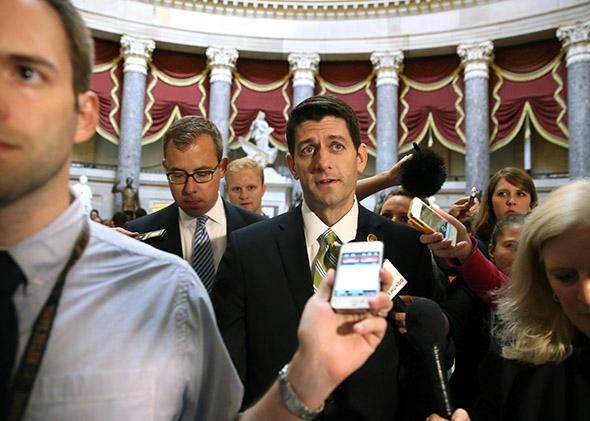What if the poor need more than disposable income to escape poverty? What if they need a life coach?
That’s the position of House Budget Chairman Paul Ryan, who in his new anti-poverty plan wants poor families to work with government agencies or charitable nonprofits to craft “life plans” as a condition of receiving federal assistance under his proposed “opportunity grants.” “In the envisioned scenario providers would work with families to design a customized life plan to provide a structured roadmap out of poverty,” Ryan writes. At a minimum, these life plans would include “a contract outlining specific and measurable benchmarks for success,” a “timeline” for meeting them, “sanctions” for breaking them, “incentives for exceeding the terms of the contract,” and “time limits”—presumably independent of actual program limits—for “remaining on cash assistance.”
Even for conservatives—who champion welfare drug tests and robust work requirements—this is breathtakingly paternalistic. As Annie Lowrey notes for New York magazine, “[I]t isolates the poor. Middle-class families don’t need to justify and prostrate themselves for tax credits. Businesses aren’t required to submit an ‘action plan’ to let the government know when they’ll stop sucking the oxygen provided by federal grant programs.” What’s more, as she also points out, it treats the poor as if they want to stay that way and all but punishes “the poorest and most unstable families for their poverty and instability.” As with other measures that tie aid to “accountability”—like family caps for welfare—a sanction can spark a downward spiral to deeper poverty.
Still, this approach has defenders. Here at Slate, my colleague Reihan Salam defends the paternalism in Ryan’s plan as a necessary response to the diversity of the poor and the idiosyncrasy of American poverty:
People with low or no earnings, in contrast, face diverse obstacles. Some need short-term help to, say, fix their car, which will allow them to commute to work, or to make a deposit on a rental apartment. Others don’t have the skills they need to earn enough to support themselves and, for whatever reason, will have a very hard time acquiring them. Sure, you could give both kinds of people food stamps and call it a day. Or you could recognize that one-size-fits-all programs don’t do justice to the ways in which individual circumstances vary.
“The theory behind having smart, dedicated caseworkers working on behalf of people who are down on their luck,” Salam continues, “is that spending a bit more time and money now could help save time and money later.”
It’s a noble and compassionate approach to anti-poverty efforts. It’s also wrongheaded. The idea that life skills are necessary to climb out of poverty—that the poor are plagued by low income and bad habits—doesn’t jibe with the facts on the ground.
Mandatory life coaching makes sense if most poverty is persistent and generational. Even with federal assistance, adults with little-to-no market income—and little experience in the workforce—are at a long-term disadvantage and likely to pass those barriers on to their children. But poverty in America is fluid; depending on the season, the unstable nature of market work may force a period of personal retrenchment.
The research bears this out. According to the latest Survey of Income and Program Participation, which draws from three years of interviews from a representative sample of American households, almost one-third of Americans were poor for two months or more during 2009, 2010, and 2011. More importantly, 44 percent of those poverty “spells” ended within four months and only 15.2 percent lasted more than two years. By contrast, just 3.5 percent of the population was poor for all three years—a tiny constituency for the kind of generational poverty that needs a Ryan-esque intervention.
At the left-leaning think tank Demos, Matt Bruenig crunches the numbers of the Census Bureau’s 2012 social and economic supplement to its annual population survey and identifies the “officially poor” as “35 percent children, 8 percent elderly, 9 percent disabled, 8 percent student, 18 percent working, and 21 percent everyone else.” He concludes: “The adult, able-bodied, non-student poor who lack personal market income comprise 3 percent of the population.” It’s just a snapshot, but it tells us there aren’t many Americans who need the intense paternalism recommended by Ryan and others.
In his response to Ryan’s anti-poverty plan, Jared Bernstein—former chief economist for Vice President Joe Biden—writes, “The main problem faced by the American poor is not that there’s something fundamentally wrong with the safety net. It’s that they lack the employment and earnings opportunities necessary to work their way out of poverty.”
Bingo. At some point in their lives, millions of Americans will experience a short spell of poverty. Not because they don’t have a plan to fix their lives or lack the skills to move forward, but because our economy isn’t run to create demand for labor, isn’t equipped to deliver stable work to everyone who wants it, and wasn’t built to address the distributive needs of everyone who works.
The best way to confront this problem for most people is to just address those needs. Yes, on the margins, there will be Americans who need an intensive approach, and I endorse government support for voluntary life coaching. (For example, look at the Center for Urban Families in Baltimore.) But by and large, the easiest solution is to mail larger checks to more people. In other words, we need more solutions like Ryan’s expansion of the Earned Income Tax Credit—the best part of his plan—and fewer life coaches for the poor.
